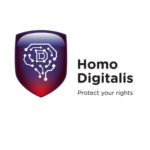Member in the Spotlight: Homo Digitalis
Homo Digitalis is the only digital rights civil society organization in Greece. Its goal is to protect of human rights and freedoms in the digital age by influencing legislators & policy makers on a national level, and raising awareness amongst the people of Greece regarding digital rights issues.
This is the 10th article of the series “EDRi member in the Spotlight” in which our members introduce themselves and their work in an in-depth highlight in interview format.
Today we get to know more about our Greek member: Homo Digitalis, which has been part of the EDRi network as a member since 2020.

Homo Digitalis Q&A
1.Who are you and what is your organisation’s goal and mission?
Homo Digitalis is the only digital rights civil society organization in Greece. Our goal is the protection of human rights and freedoms in the digital age. We strive to influence legislators & policy makers on a national level, and to raise awareness amongst the people of Greece regarding digital rights issues. Moreover, when digital rights are jeopardized by public or private actors, we carry out investigations, conduct studies and proceed to legal actions.
2. How did it all begin, and how did your organisation develop its work?
Homo Digitalis was founded in 2018 by 6 tech lawyers with a strong passion about the protection and promotion of digital rights. No digital rights organisations existed in Greece before. So, we wanted to create an organisation that could bring like-minded people together and shake things up. After two years of voluntary work, we have managed to grow into an organization with more than 100 members, who
bring together a wide variety of disciplines such as law, computer science, humanities and social sciences.
We aim to transform Homo Digitalis from an organization based on voluntary work to a strong watchdog with a long-term strategy and full-time personnel. It will be a long and difficult path, but we have started acquiring our first grants and we are confident that we will grow, gaining more recognition and support for
us and our vision.
3. The biggest opportunity created by advancements in information and communication technology is…
…facilitating access to information all around the globe, and building bridges between people. These advancements constitute a driver for positive change in our societies, and could lead to enhanced equality and transparency.
4. The biggest threat created by advancements in information and communication technology is…
…mass surveillance of our societies and power asymmetry in the information economy.
5. Which are the biggest victories/successes/achievements of your organisation?
Becoming a full member of EDRi is certainly a great success of Homo Digitalis so far!
Additionally, Homo Digitalis has managed to achieve important accomplishments over the last two years. We have increased public awareness on digital rights issues by generating media interest in our actions, visiting educational institutions and participating in events, campaigns, and giving talks all around Greece. Moreover, we were instrumental in influencing the public debate around data protection reform in Greece by cooperating with related stakeholders, and by filing complaints and requests before EU and national
authorities, respectively.
Also, through access to information requests, complaints, and investigations we have attained a high level of scrutiny regarding projects on technology-led policing and border management activities in Greece. In addition, we have collaborated with investigative journalists to reveal important facts. Even though we are an organization based solely on volunteers, we give our best to respond quickly to the challenges that arise.
Furthermore, we have been fortunate enough to participate shoulder to shoulder with powerful digital rights organisations in EU-wide projects and campaigns and to learn from their expertise and knowledge. Finally,
we also had the great opportunity to present our views and opinions in important fora, such as the UN Human Rights Council 39th session in Geneva or the European Parliament in Brussels.
All these accomplishments over the last two years give us the strength to continue our work towards the protection and promotion of human rights in the digital age.
6. If your organisation could now change one thing in your country, what would that be?
Active participation of people in collective activities such as digital rights activism. If individuals could devote a part of their knowledge and time to such activities, we would have a stronger voice to influence policy makers and legislators towards political decisions that respect our rights and freedoms and not violate them,
instead.
7. What is the biggest challenge your organisation is currently facing in your country?
After 10 years of financial crisis and austerity measures in Greece that limited public spending, we witness over the last years an increase in funds used for technology-led policing and border managements
projects. Thus, we must stay wide-awake in order to challenge and fight back the implementation of intrusive tools and technologies in our societies that limit our rights and freedoms.
8. How can one get in touch with you if they want to help as a volunteer, or donate to support your work?
You can visit our website to help us as a volunteer or to donate and support our work.
Also, we always appreciate a good conversation, so feel free to reach out to . Last but not least, you can subscribe to our newsletter here.
Discover more about Homo Digitalis





